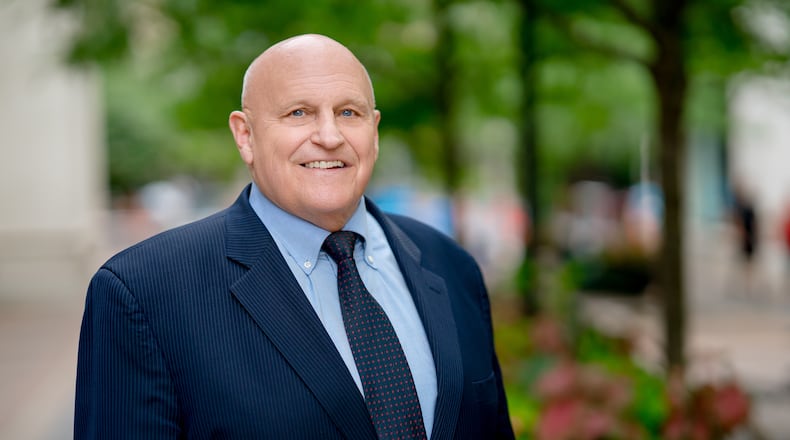It was late spring 2002, and I was barely into my tenure as a sportswriter for The Atlanta Journal-Constitution when I first met then-Deputy Secretary of State Richard L. Armitage while in D.C.
Armitage, who passed away last week at age 79, was raised in Atlanta, graduating from St. Pius X Catholic High School in 1963 before attending the U.S, Naval Academy, where he played football. He wasted no time in asking a question of me after learning I worked for the AJC.
“Ever heard of Manuel’s?” he asked, sending me into immediate laughter.
As it turns out, Armitage had played high school football with the late Michael Maloof, whose family still owns the iconic Atlanta watering hole known for being home to many local journalists and politicians alike. While in high school, Armitage and the Maloof brothers used to make a little extra money at the restaurant by stacking beer cases on Sundays.
I assured Armitage that I was indeed no stranger to Manuel’s Tavern, but there was no way that I could have guessed that making his acquaintance that day would forever change my life for the better.
That’s because Richard Lee Armitage was a man of tremendous honor and courage and unyielding loyalty to those closest to him. There are few people on this planet for whom I’ve held more respect and admiration.
And not just because of the brilliant military and diplomatic career he enjoyed while serving America for decades, both in uniform and out.
I viewed Armitage with tremendous reverence because his actions had matched his words throughout his life. When he was with you, he was with you for keeps.
He was easily the biggest champion for “Sgt. Rodney M. Davis: The Making of a Hero,” my 2018 book that chronicled the inspirational life and death of Macon’s lone Medal of Honor recipient.
But nothing he did for me compares to what he did for the more than 30,000 Vietnamese lives he’s directly credited for saving after disobeying a direct Pentagon order in April 1975 to abandon his South Vietnamese government allies in the waning days of the Vietnam War.
Armitage saw a lot of heavy action over the course of his three combat tours in Vietnam with the U.S. Navy, but was a civilian by the time communist forces were about to take Saigon. He was under strict orders to prevent South Vietnamese planes and naval ships from falling into the hands of advancing North Vietnamese forces by destroying them if necessary, and specifically told to abandon the many South Vietnamese government and military officials who had risked their own lives to help him.
But deserting your friends in time of need was never Armitage’s style.
Armitage devised a plan of his own, arriving dirty, armed and unannounced at a U.S. Navy warship and telling the stunned skipper that he was taking charge of his ship. There were no immediate communications back then as there are now, so it took about 20 minutes before Secretary of Defense James Schlesinger himself messaged the ship’s captain back that he was to follow Armitage’s orders.
Only a small group of Vietnamese sailors and their families originally were slated to meet him at specific coordinates a few miles offshore in the South China Sea, but that had ballooned into a flotilla of ships of every imaginable kind as word had quickly spread and desperate Vietnamese everywhere jumped at the opportunity.
Armitage’s ragtag fleet arrived at Subic Bay in the Philippines, only to be denied entry by President Ferdinand Marcos. Not to be outdone, Armitage arranged for a U.S. Marine contingent to meet them offshore and re-flag all ships under American flags so they’d be let in. For his efforts, Armitage was placed under house arrest upon his arrival in Subic Bay. He liked to joke that he drank a lot of beer and watched a lot of TV for two days.
So it was that incredible story that I had in mind just a few years ago when Armitage and I engaged in a deep heart-to-heart discussion about the stirring story of Sgt. Davis and his own service in Vietnam following one of our weekly Saturday morning basketball games.
Like many Vietnam veterans, Armitage carried a lot of scars from the war with him, and those experiences helped shape his subsequent world view. Yet he confessed to me one morning that he’d seen a lot of death and said that he just hoped that his ledger was on the positive side when it was his time to transition home.
I quickly reminded him that it was a war, and that he had dutifully answered his country’s call.
Not only did those 30,000 Vietnamese owe their lives to him, I added, but so, too, did their many kids and grandkids, many of whom might not exist today if not for the loyalty and tenaciousness of Richard Armitage exactly 50 years ago this month.
There’s a large Vietnamese-American community in Northern Virginia just outside Washington, D.C., today, and they often thanked Armitage for all he’d done to make their current lives possible.
That’s among the many things that make Rich Armitage’s legacy an enduring one, and they collectively made him one-of-one. So check out the picture of him on the wall in the back room the next time you frequent Manuel’s.
Richard Armitage was an American treasure.
Credit: Natrice Miller / Natrice.Miller@ajc.com
Credit: Natrice Miller / Natrice.Miller@ajc.com
Former Atlanta Journal-Constitution sports writer John D. Hollis is the author of “Sgt. Rodney M. Davis: The Making of a Hero.”
About the Author
Keep Reading
The Latest
Featured



